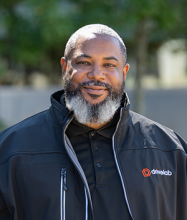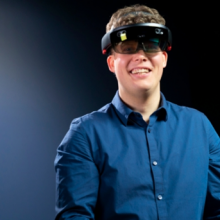Past Seminars
The HCII Seminar Series has been a weekly tradition at CMU since 1990. Details of our seminars from 2014 to present, as well as many of their recordings, are available below. A few years ago, we held a year of special programming in celebration of the seminar's 25th anniversary.
| Date | Title | Speaker | Talk title and Abstract |
|---|---|---|---|
| HCII Seminar Series - Julian Brinkley |
Julian Brinkley Assistant Professor of Human-Centered Computing, School of Computing, Clemson University |
“(De)evolving Towards Inaccessibility? Exploring the Evolution of In-Vehicle Information Systems (IVIS) and the Implications for Human-Machine Interfaces in Emerging Self-Driving Vehicles” Fully autonomous or “self-driving” vehicles have been described as a potentially transformative… Full Details |
|
| HCII Seminar Series - Daniel Epstein |
Daniel Epstein Assistant Professor in the Department of Informatics, University of California at Irvine |
"Towards More Meaningful Personal Tracking" Personal tracking through digital technologies like pedometers, mood monitoring apps, and food journaling apps has great potential to help people begin to change their behaviors, understand their habits, connect with others and advocate… Full Details |
|
| HCII Seminar Series - Steven Dow |
Steven Dow Associate Professor of Cognitive Science, UC San Diego |
"Advancing Socio-Technical Systems for Community-Driven Creativity" As the world’s problems increase in scope and complexity, the practice of design has been shifting. Designers are seen less as saviors and more as facilitators of problem-solving processes. As the practice of design… Full Details |
|
| HCII Seminar Series - Stevie Chancellor |
Stevie Chancellor Assistant Professor in the Department of Computer Science & Engineering at the University of Minnesota |
"Human-centered Machine Learning for Dangerous Mental Illness Behaviors Online" Research and industry both use machine learning (ML) to identify and intervene in physically dangerous health behaviors discussed on social media, such as advocating… Full Details |
|
| HCII Seminar Series - Rich Caruana |
Rich Caruana Senior Principal Researcher at Microsoft Research in Redmond, WA |
"Friends Don’t Let Friends Deploy Black-Box Models: The Importance of Intelligibility in Machine Learning" In machine learning sometimes tradeoffs must be made between accuracy, privacy and intelligibility: the most accurate models usually are not very intelligible or private,… Full Details |
|
| HCII Seminar Series - George Aye |
George Aye Cofounder and Director of innovation at Greater Good Studio. Full Professor (Adj) at the School of the Art Institute of Chicago |
"That Quiet Little Voice: When Design and Ethics Collide" The design industry’s relationship to the field of business has long been established and continues to become further entangled each year. But designers aren’t just satisfied with only disrupting the business sector—they’re keen to… Full Details |
|
| HCII Seminar Series - Ken Koedinger |
Ken Koedinger Hillman Professor and METALS Program Director, Carnegie Mellon University |
"Opportunities Matter: Hybrid Human-Computer Tutoring Toward Educational Equity" Across 27 datasets of students learning online, we find an astonishing regularity in the rate they learn. That’s the good news. When given quality practice opportunities with feedback and as-needed… Full Details |
|
| HCII Seminar Series - Andrew Begel |
Andrew Begel Associate Professor, Institute for Software Research at Carnegie Mellon University |
"CodeWalk: Facilitating Shared Awareness in Mixed-Ability Collaborative Software Development" COVID-19 accelerated the trend toward remote software development, increasing the need for tightly-coupled synchronous collaboration. Existing tools and practices impose high coordination… Full Details |
|
| HCII Special Seminar - David Karger |
David Karger Professor in the Electrical Engineering and Computer Science department and member of the Computer Science and AI Laboratory at MIT |
"Descriptive Languages to Help Non-programmers Create their own Web Applications" The web is teeming with data, and interacting with that data is a key part of modern knowledge work. But traditionally, only programmers have been able to create the tools to support those… Full Details |
|
| HCII Special Seminar - Josiah Hester |
Josiah Hester Breed Chair of Design and Assistant Professor of Computer Engineering at Northwestern University |
"Batteries Not Included: Reimagining Computing for the Next Trillion Devices" In this talk, I'd like to upend the notion that a computing system needs reliable power to support useful computation, sensing, and interaction. For decades, typical computing systems have generally assumed stable,… Full Details | |
| HCII Seminar Series - Janet Vertesi |
Janet Vertesi Associate Professor, Sociology Department, Princeton University |
"Building Anti-Racist Technologies: A Critical HCI Approach" From soap dispensers and pulse oximeters that don’t see dark skin, to surveillance and incarceration systems implemented in ‘smart’ cities, our current technologies are racist. Authors in HCI and in the social studies… Full Details |
|
| HCII Seminar Series - Andrés Monroy-Hernández |
Andrés Monroy-Hernández Principal Research Scientist at Snap Inc., Asst. Professor at Princeton Computer Science |
"Playful Co-Located Interactions with Mobile Augmented Reality" It is common to spend hours on our digital devices connecting with people far away while disconnecting from those right beside us. Even before the pandemic, researchers have argued that digital technologies make us… Full Details |
|
| SCS DEI Seminar: Data-Driven Diversity with Kody Manke and Kevin Jarbo |
Kody Manke, Psychology Department and Kevin Jarbo, Social and Decision Sciences Both are CMU Faculty |
(Virtual presentation) |
|
| HCII Seminar Series - Postdocs |
4 HCII Postdocs |
Pallavi ChhabraCMU Postdoc, faculty advisor Ken Koedinger Title: Improving Motivation and Learning Outcomes in Math in an Intelligent Tutor Environment Abstract: … Full Details |
|
| HCII Seminar Series - Andy Wilson |
Andy Wilson Partner researcher, Microsoft Research |
"Blending Virtual and Physical Realities with RealityShader" The metaverse is about more than VR headsets and always has been. At Microsoft Research we have been exploring the use of depth cameras and projectors to blend virtual and physical realities without headsets. Projects… Full Details |
|
| HCII Seminar Series - Michael Nebeling |
Michael Nebeling Assistant Professor of Information, University of Michigan |
"Extended Reality for Everybody" Technical advances in virtual, augmented reality, and mixed reality (XR) have paved the way for these immersive technologies to become increasingly mainstream; however, from a design perspective, there is still a high barrier to entry. A lot of… Full Details |
|
| HCII Seminar Series - Nithya Sambasivan |
Nithya Sambasivan |
"All Equation, No Human: The Myopia of Model Centrism" AI models seek to intervene in increasingly higher stakes domains, such as cancer detection and microloan allocation. What is the view of the world that guides AI development in high risk areas, and how does this… Full Details |
|
| HCII Seminar Series - Jay Aronson |
Jay Aronson Founder and director of the Center for Human Rights Science at Carnegie Mellon University and Professor of Science, Technology, and Society in the History Department |
“Technology for Social Good? AI, Human Rights, and Harm Reduction” Abstract |
|
| HCII Seminar Series - 4 HCII Postdocs |
Alex Ahmed, Hope Chidziwisano, Qiuyu (Luca) Lu and Deniz Sayar HCII Postdocs |
The HCII regularly gives our postdocs an opportunity to present during the HCII Speaker Series. This Friday’s seminar will feature four presentations in a hybrid format -- three will be presenting in person in NSH and one will be presenting remotely. If you are available, we hope you will join… Full Details |
|
| HCII Seminar Series - featuring HCII Postdocs |
Adetunji Adeniran, Danielle Chine and Tricia Ngoon Postdoctoral Researchers |
The HCII regularly gives our postdocs an opportunity to present during the HCII Speaker Series. This week we will hear from three postdocs from the learning sciences: Adetunji Adeniran, Danielle Chine and Tricia Ngoon. Each person will present for approximately 15… Full Details |
|
| HCII Seminar Series - Amy Pavel |
Amy Pavel Assistant Professor in the Department of Computer Science at the University of Texas, Austin |
Human-AI Systems for Making Videos Useful Video is becoming a core medium for communicating a wide range of content, including educational lectures, vlogs, and how-to tutorials. While videos are engaging and informative, they lack the familiar and useful affordances of text for… Full Details |
|
| HCII Seminar Series - Leah Buechley |
Leah Buechley Associate Professor, Department of Computer Science, University of New Mexico |
"Hand and Machine" I believe that by making technology more accessible and building artifacts that look and feel different from anything that has been built in the past, I can change and broaden the culture of technology. I can get a diverse range of people… Full Details |
|
| HCII Seminar Series - Shunichi Kasahara |
Shunichi Kasahara Researcher, Group leader at Sony Computer Science Laboratories |
"Superception : Exploring new “Self” in the integration of humans and computers" When computers and humans integrate, to what extent are we ourselves? Computers are already no longer tools of humans, but are gaining the ability to make decisions and actions beyond… Full Details |
|
| HCII Seminar Series - Kat Schrier Shaenfield |
Kat Schrier Shaenfield Associate Professor/Director of Games, Marist College, School of Communication and the Arts; Consultant, Game Designer, World Health Organization (WHO) |
"What if We Could Design Games to Reduce Biases and Enhance Compassion?" Virtual reality (VR) and other types of games have been developed for educational purposes, with mixed results. We are still learning the best practices (and limitations) for designing games for skill… Full Details |
|
| HCII Seminar Series - Tom Hope |
Tom Hope Postdoctoral researcher at The Allen Institute for AI (AI2) and The University of Washington |
"Harnessing Scientific Literature for Boosting Discovery and Innovation" In the year 1665, the first academic journal was published. Fast forward to today, there are millions of scientific papers coming out every year. This explosion of knowledge represents an opportunity to accelerate… Full Details |
|
| HCII Speaker Series - Daragh Byrne |
Daragh Byrne Associate Teaching Track faculty, School of Architecture, Carnegie Mellon University |
"Storytelling with data and devices: making sense of the quantified self" Stories about our everyday experiences are one of the main sensemaking methods we use to find meaning in our lives. As our lives are increasingly documented through smartphones, social media, and… Full Details |
|
| HCII Seminar Series - Nazanin Andalibi |
Nazanin (Naz) Andalibi Assistant Professor, University of Michigan School of Information |
"Where is the Human in Emotion Recognition/AI Technologies?" Emotions are powerful, mediate humans’ experiences with their surroundings, and impact decision-making and attention online and off. Sharing and signaling one’s emotions to other humans can be beneficial, but involves… Full Details |
|
| HCII Seminar Series - Joel Chan |
Joel Chan Assistant Professor, University of Maryland, College of Information Studies (iSchool) |
"Accelerating Scientific Discovery by Lowering Barriers to User-Generated Synthesis of Scientific Literature" In today's scholarly communication infrastructure, it is practically impossible to get timely answers to basic questions like "What is the best evidence that informs how… Full Details |
|
| HCII Seminar Series - Marshini Chetty |
Marshini Chetty Assistant Professor, Computer Science Department, University of Chicago |
"Imagine All The People On A Trustworthy Internet"
Imagine a world where the Internet caters to all types of users and hosts trustworthy content. Right now, this world seems far off for many reasons. For instance, this world would require us to think more broadly… Full Details |
|
| HCII Seminar Series - Susan Wyche |
Susan Wyche Associate Professor, Michigan State University, Department of Media and Information |
"Reconsidering Human-Centered Approaches to Design in Human-Computer Interaction and Development (HCI4D): Using Design Methods to Reimagine Technology in Rural Kenya" Enthusiasm for using human-centered design persists among HCI and HCI4D researchers and practitioners; funding… Full Details |


























